P.S. From Paris (US Edition) Read online
Page 8
“She’s rambling under her breath. This is awful. I’m going to kill Arthur and chop him up into tiny pieces. Give people an inch, they take a mile. Where the hell are they, damn it?”
“You were just muttering there, yourself,” said Mia.
“I . . . don’t think I was. You were, for sure.”
“Maybe this isn’t such a great idea. Like I said, it’s my first time, and it’s . . . well, it’s even more awkward than I expected.”
“You’re telling me this is your first time in Paris? Your French is impressive—where did you learn it?”
“What? No, that’s not what I meant. This is not my first time in Paris at all. My best friend is French—we’ve known each other since we were kids. She came to stay with my family to learn English, and then I went to Provence to spend my holidays with her family.”
“Ah, so that’s why the food at your restaurant is Provençal?”
“Exactly.”
A silence descended. It only lasted a few minutes, but to them it seemed an eternity. The waitress came back with the menus.
“If they don’t show up soon, we should just order without them,” Paul exclaimed. “It would serve them right.”
“I think I may have lost my appetite,” Mia said, putting the menu back on the table.
“That’s a shame, they make some amazing food here. I’ve read some really great reviews about this place.”
“Right. ‘Baked sea bream infused with exotic herbs,’ like you told me in your message.”
“Message? What message?” Paul asked, wide-eyed. “When did I send you a message?”
“Are you on some sort of medication?”
“No. Why, are you?”
“Oh my God. Okay. I get it,” Mia sighed. “You’re trying to make me laugh, to get me to unwind. But you can stop, because it’s really not working. In fact, your whole—thing—kind of has me a little frightened. I mean, fair play, fine. Now I get it, and you can just stop.”
“I wasn’t pulling any kind of prank . . . And what did I do to freak you out?”
“All right, confirmed, the guy is completely, stark-raving mad. Just don’t upset him. Worse comes to worst, I order just a starter, and I’m out in under fifteen minutes. You’re right, let’s not wait any longer for them—it’s their fault for not being on time.”
“Exactly! Let’s order, and then you can tell me about your project.”
“What project?”
“Your restaurant!”
“Not much more to tell you—Southern French cuisine. Niçois, to be precise.”
“I love Nice! I was invited there for the book fair last June. The heat was kind of unbearable, but the people were really friendly. Well, the few who lined up to get their books signed.”
“How many novels have you written?”
“Six. The first one included, of course.”
“Why wouldn’t it be included?”
“No reason . . . Well, actually, it’s because I didn’t really know I was writing it while I was writing it.”
“This guy is really driving me up the wall. What on earth is wrong with him?” Her muttering was beginning to get louder. “Um, what is it you thought you were doing—building a sandcastle?”
“Either she is a complete and utter moron or she’s sitting there thinking that’s what I am. No, what I mean is that I couldn’t conceive of it being published at the time. I hadn’t even thought of sending it to a publisher.”
“But it was published?”
“Yes. Lauren sent it on my behalf—without asking my permission, actually—but hey, I guess I can’t hold that against her. It wasn’t easy at first, but it’s thanks to what she did that I ended up moving out here.”
“Can I ask you a weird question?”
“You can. I mean, I can’t guarantee I’ll answer.”
“Do you live far from here?”
“In the third arrondissement.”
“Which is more than five hundred yards from where we are.”
“We’re actually in the first, so yeah, it’s pretty far. Why?”
“No reason.”
“And what about you?”
“I live in Montmartre.”
“That’s a beautiful area. Let’s order, shall we?”
Paul called over the waitress.
“So. Sea bream?” Paul suggested, looking at Mia.
“Does that take long to cook?” she asked the waitress, who shook her head and departed.
Paul leaned toward Mia, his lips quirked in a grin.
“I don’t want to stick my nose in where it’s not wanted, but if you’re going to open a seafood restaurant, it might be helpful to know how long it takes to cook sea bream. Just a thought,” he said, chuckling.
This time, the silence stretched on and on. Paul looked at Mia and Mia looked at Paul.
“So, you like San Francisco?” Paul asked. “Did you use to live there?”
“No, but I’ve been there several times for work. And it is a beautiful city—I love the quality of the light out there.”
“Now I get it! You trained as a chef at Alioto’s and that’s why you’ve decided to bring their concept over here.”
“Who in the world is Alioto?”
“I’m going to kill him. I’m going to kill them both,” Paul muttered—this time, unfortunately, loud enough for Mia to hear him. “This is on him, a hundred percent. I mean, the least he could do is provide accurate intel.”
“So, this double murder—you meant that figuratively, I hope?”
My God, how thick is this woman? What the hell am I doing here? Seriously, why am I here when I could be at home? “Yes, I can assure you beyond the shadow of a doubt that I have no intention of murdering anyone, but you have to admit the situation is a little off! I must come across as an incompetent chump who doesn’t even know the ins and outs of the project he’s working on . . .”
“Okay. So I’m a ‘project,’ then?”
“Are you doing this deliberately? I don’t mean you personally, but whatever it is that’s brought us both here.”
“Well,” said Mia in a firm tone, hands flat on the table, “I think we’ve covered the essentials, and as I’m not really so hungry anymore . . .” Nope, not hungry. Absolutely starving. “I’ll let you enjoy the sea bream without me.”
“I completely understand how that sounded,” said Paul, blushing. “That was a clumsy thing to say. Please accept my apology. In my defense, it’s been a long time since I’ve done this kind of thing. I think I must have lost my touch. I told him I wouldn’t be any good at it—I should have just flat-out turned him down. And, of course, he never should have left me on my own like this. That was really unfair of him. Both of them.”
“Are you being haunted by ghosts or do the people you keep mentioning actually exist?”
“She’s completely nuts! I’m stuck at a restaurant with a crazy person. There’s no way this project even exists.”
“You’re muttering again.”
“‘They’ refers to my former business partner, Arthur, and his wife, Lauren. You were in contact with them to help design your new restaurant . . . ?”
“I don’t think so,” she replied warily.
“Well, obviously not anymore. But before this disastrous meeting of ours, that was what you were planning, right?”
“I’m afraid I haven’t the faintest idea what you’re talking about.”
“Now I’m confused. Then why are you here?”
“You know, for a while there I wasn’t a hundred percent sure. But I am now. You’re completely mad. Daisy warned me—I should have listened.”
“Well, that’s charming! I don’t see how Daisy could have told you I’m mad, because I don’t even know a Daisy. Well, one Daisy, to be fair, but that was an ambulance, not a person. Scratch that—long story. Who is your Daisy?”
Mia looked around for the waitress so she could leave. This nutcase wouldn’t dare follow her out onto the street with the restaurant staff l
ooking on. Once she got rid of him, she would go back to Montmartre and delete her profile from that damn website, and everything would go back to normal. After that, she would eat dinner at La Clamada, because she was starving to death.
“Why do you think I’m mad?” Paul asked.
“Listen, this is not working out. I was messing around, playing games, and I regret it.”
Paul gave a long sigh of relief.
“Of course! I should have known. You’ve been pulling my leg this whole time. The three of you probably planned it out together. Great, you got me. Bravo!” He applauded her. “All right, where are they hiding? You can tell them to come out. I admit defeat. And I gotta admit, it was a good one!”
Grinning, Paul scanned the restaurant for Arthur and Lauren. Mia kept looking toward the kitchen.
“Are you . . . really a writer?” she asked, her face tight with dismay.
“Of course I am,” he said, turning to face her again.
“Well, that must be it. Characters take hold of the author and end up becoming an actual part of his life. That’s not necessarily a bad thing—I suppose there’s even a kind of poetry to a gentle madness like that. And your message was charming. But now, if you don’t mind, I’m going to leave you with ‘them’ and go home.”
Message? “Remind me again what I said in this ‘message.’”
Mia took the sheet of paper from her pocket, unfolded it, and handed it to Paul.
“These are your words, correct?”
Paul read the text attentively and looked up at Mia, confused.
“It’s true I have a lot in common with this guy—I could have even written the same thing, more or less, to be honest—but the jig is up; quit messing around.”
“I am not messing around. A picture of you was on the profile!”
“What profile?”
“The profile you posted on the dating site, with your picture.”
“I’ve never been on a dating site in my life, and I have no idea what you’re talking about. The only plausible explanation is that we’re both supposed to be meeting someone else.”
“Look around. I don’t see your doppelganger anywhere.”
“Maybe we both got the wrong address?” Paul said, then instantly realized the absurdity of what he was suggesting.
“Unless . . . the man I had arranged a date with started this charade of mistaken identity . . . after a sudden change of heart when he saw what I looked like in person.”
“Impossible. He’d have to be blind.”
“Thank you for that, at least. I read so much honesty in your note. It’s a shame you’re not the same way in person.”
Mia stood up. Paul did the same, and took her hand.
“Hold on, wait. Please sit down. There’s got to be a logical explanation for all this, unless . . . No, there’s no way. They wouldn’t dream of pulling such a dirty trick.”
“Your invisible friends, you mean?”
“You don’t know the half of it. This is not the first time I’ve been left holding the bag for Lauren, and had to face the consequences.”
“Whatever you say. Now, I’m leaving. Promise you won’t . . . follow me?”
“Why on earth would I follow you?”
Mia shrugged. She was about to leave the table when the waitress appeared. The sea bream looked and smelled divine and Mia’s stomach began growling so loudly that the waitress smiled as she placed the dish in the middle of the table.
“Sounds like I arrived just in time!” she said. “Bon appétit.”
Paul sliced fillets from the fish and put two on Mia’s plate. He had received a message on his phone, and he paused to read it.
“Okay. This time, I really am apologizing to you—wholeheartedly and in all seriousness,” he said, placing his phone on the table.
“Apology accepted. But as soon as we’re done eating, I’m off.”
“Don’t you want to know what I’m apologizing for?”
“Not particularly, but I imagine I’m about to find out . . .”
“I admit, I actually thought you were the nutcase. Now I have proof that you’re not.”
“What a relief. Unfortunately, I can’t really say the same about you . . .”
Paul handed his phone to Mia.
Paul,
We wanted to give fate a little nudge and, as you’ll have guessed by now, we played a hell of a trick on you. I hope you managed to have a nice evening, all the same. I must admit that we’ve spent our night in a dizzying mix of guilt and hysterical laughter. Your revenge will have to wait, because we left for Honfleur this afternoon. In fact, I’m writing from the restaurant where we’re having dinner. The fish is excellent, the town is picture-postcard gorgeous, and Lauren totally fell in love with it. Plus, the inn we’re staying at tonight seems absolutely perfect. We’ll be back in a couple of days, maybe more, depending on how long it takes for you to forgive us. I’m sure you’re furious for the time being, but in a few years we’ll be laughing over this together, and who knows? If this Mia becomes the love of your life, you’ll be eternally grateful to us!
In light of all the pranks you’ve played on me . . . we’re even now. Well, almost . . .
Love,
Arthur and Lauren
Mia put the phone down on the table and drained her glass of wine in one go. Paul found this quite surprising, but he was getting used to the feeling.
“Well,” she said, “good news is: at least I’m not eating dinner with a lunatic.”
“What’s the bad news?” Paul asked.
“Your friends have a very twisted sense of humor, particularly for the victims of their jokes. This whole thing has been downright humiliating for me.”
“I beg to differ. If anyone looks like an ass right now, it’s me!”
“At least you didn’t actually join a dating site, though. I feel pathetic.”
“I have thought about it occasionally,” Paul admitted. “I promise that’s the truth—I’m not just saying that to be polite. I could have totally joined one.”
“But you didn’t.”
“It’s the thought that counts, right?”
Paul filled Mia’s glass and suggested a toast.
“And what exactly are we drinking to?”
“To a dinner that neither of us can ever tell a living soul about. That in itself makes it completely unique. I have a proposal for you—no strings attached.”
“If it’s dessert, count me in. This fish is not exactly filling.”
“Dessert. Absolutely!”
“But what did you have in mind?”
“Could you show me the message I was supposed to have written? I just want to reread part of it.”
Mia gave it to him.
“There, that’s the line. Let’s prove we’re braver than fictional characters. At least let’s have enough courage not to leave this table both feeling completely humiliated. Let’s erase everything that’s happened up until now, every word we’ve said. It’s easy—think of it like hitting a key on the computer and we go back and delete the text. Let’s rewrite the scene together, starting from the moment when you walked in.”
Mia smiled at these words.
“Well, I know one thing for sure—you certainly are a writer.”
“See? That’s a great opening sentence for a chapter. We could follow with your Truman Capote quote.”
“I thought writers were quite old,” she repeated.
“As long as they don’t die young, they all inevitably end up that way. So did you like the message I wrote?”
“There were things that appealed to me—enough to make me show up tonight.”
“It took me hours to write.”
“I’m sure it took me just as long to reply.”
“I would love the chance to ‘reread’ that reply. So, you have a restaurant serving Provençal cuisine? Pretty original for a Brit.”
“All my summers growing up were spent in Provence. Funny how childhood memories can be
so formative in terms of taste, figuring out what you want. What about you? Where did you grow up?”
“San Francisco.”
“So how does an American writer end up Parisian?”
“It’s a long story. But I don’t like going on and on about myself—boring subject.”
“I suppose I’m not really crazy about myself as the subject either.”
“Careful. We run the risk of getting writer’s block.”
“What about a description of this place? That could certainly fill a few pages.”
“You only need two or three details to set the scene. More than that and you can lose the reader’s interest.”
“I thought there was no formula for good writing.”
“I was speaking as a reader, not a writer. Do you like long descriptions?”
“No, you’re right, they can be rather tedious. So what do we write now? What do the two protagonists do next?”
“Order a dessert?”
“Just one?”
“Good point. Two. It’s their first date, remember. We need to maintain a certain distance between them.”
“As cowriter, I might point out the fact that Madame’s glass is empty, and she’d love it if her date would pour her another.”
“Excellent idea! Although he really should have taken care of that before she had to ask.”
“Except she might have thought he was trying to get her drunk.”
“Ah. I forgot she’s British.”
“Aside from that, what are your biggest turnoffs with women?”
“If you don’t mind me saying so, what if she rephrased the question in a positive light? For example: What do you like most in a woman?”
“Oh, no, not so fast—that’s not the same thing at all. And if the question had been put that way, it could seem like she’s trying to hit on him.”
“That’s debatable, but fine. Anyway, biggest turnoff is lying. But to put it in a positive light, my answer would have been ‘honesty.’”
Mia looked at him for a long time, then said: “I’m not going to sleep with you.”
“I beg your pardon?”
“Just a bit of honesty.”
“Thanks, I think. That might have been more brutal than honest. And what do you look for in a man?”
“Sincerity.”
“I sincerely had no intention of trying to sleep with you.”

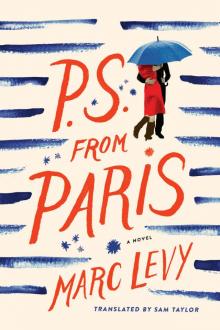 P.S. From Paris (US Edition)
P.S. From Paris (US Edition)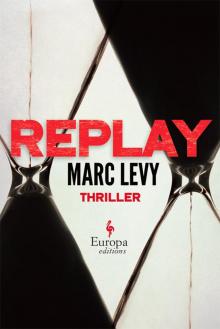 Replay
Replay The Strange Journey of Alice Pendelbury
The Strange Journey of Alice Pendelbury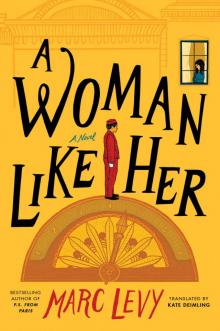 A Woman Like Her
A Woman Like Her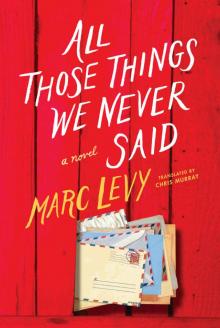 All Those Things We Never Said
All Those Things We Never Said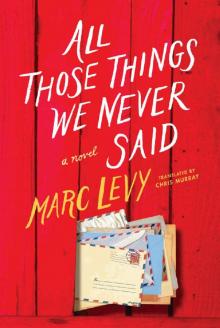 All Those Things We Never Said (US Edition)
All Those Things We Never Said (US Edition)